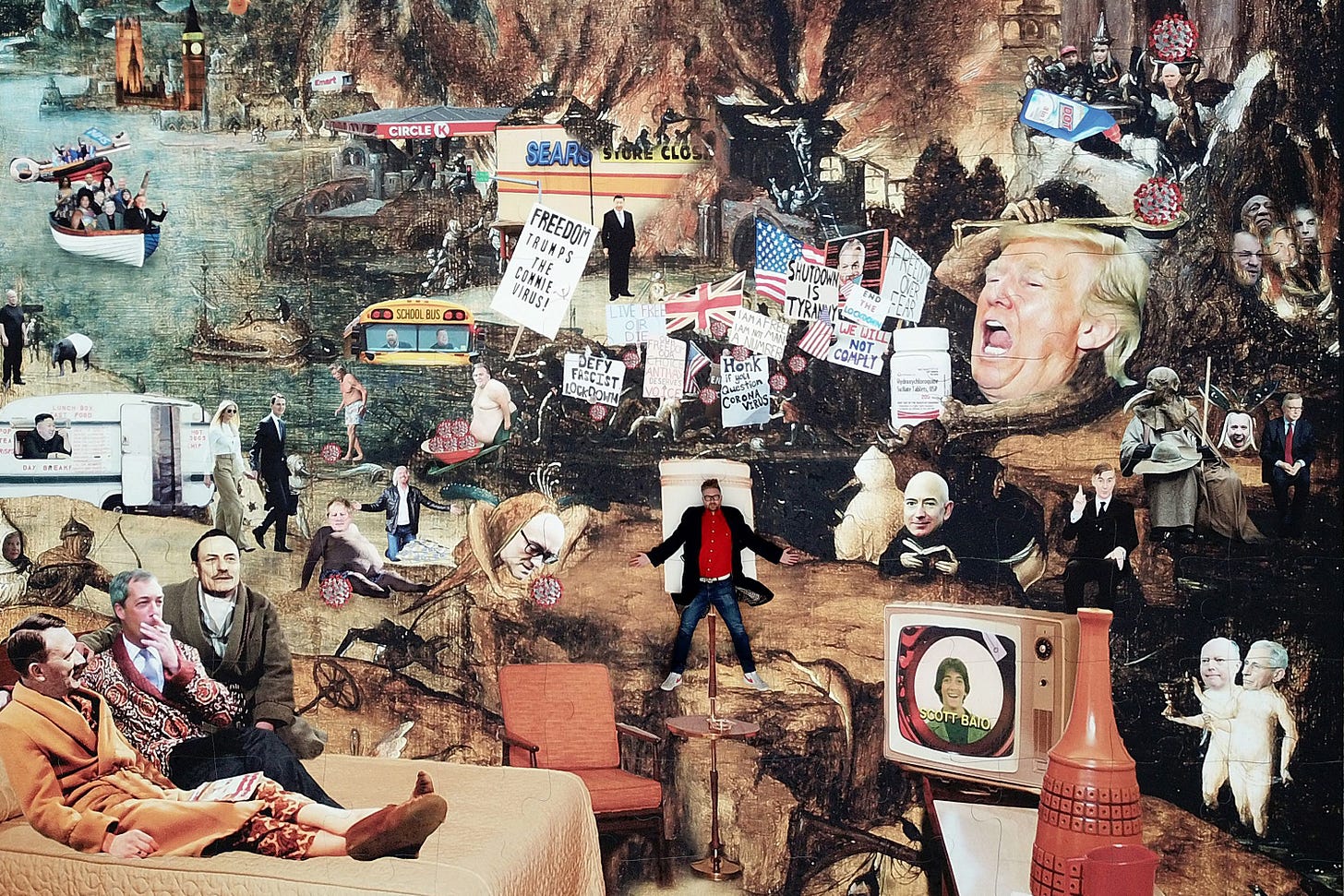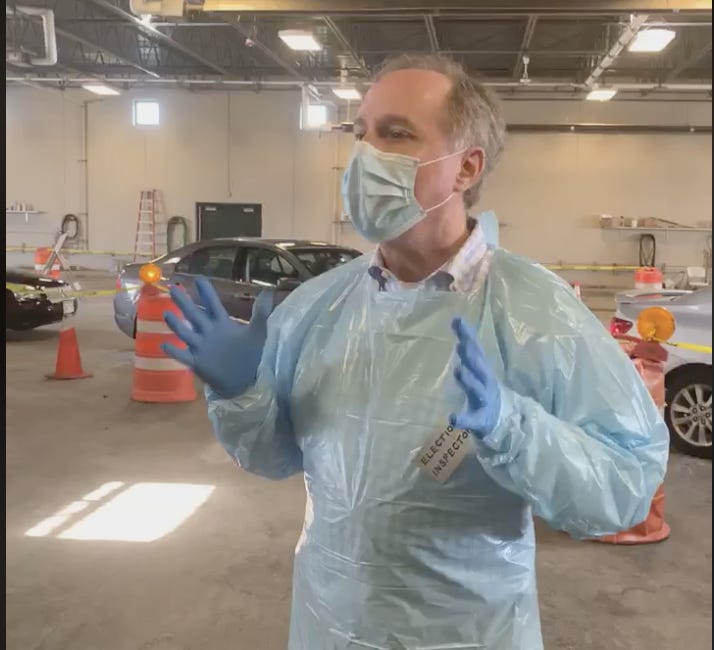
Aerial view of artist Cold War Steve, who's real name is Christopher Spencer, posing with his latest artwork entitled "Trumpscape”, a 144-piece, 12.5 x 11 meter artwork made in the form of a jigsaw puzzle, and is a portrayal of US President Donald Trump's America in the age of the COVID-19 pandemic. (Photo by Paul ELLIS / AFP)
Someday historians will ask: so what was it like waking up on the morning of October 2, 2020? (Actually, they probably won’t. But they should, because daaaaaaaamn.)
Welcome to the Countdown Journal. There are 32 days until Election day, and then 78 days after that until the Inauguration.
The president and the First Lady have tested positive for the coronavirus. Thoughts and prayers for any remaining shred of irony left in the universe.
Just two days earlier Trump mocked Joe Biden for wearing masks.
Just last night, at the Al Smith Dinner, Trump declared that the end of the pandemic was “in sight.” But more than 7 million Americans have tested positive and now Donald Trump is one more number in that statistic. Or, as the president himself might say, “It is what it is.”
The odds are that Trump will recover, and there may be a sympathy backlash, but there is no way this is good news for a presidency built on denial, or for a president who has flaunted his lack of empathy.
This comes at the end of a week in which:
*Trump’s tax dodging was revealed, exposing his fraudulent financial empire, and massive, ugly debts.
*Trump is losing at the polls and being outspent by his challenger.
*Lindsey Graham is TIED with his Democratic challenger.
*Trump bullied and hectored himself closer to political oblivion during the first (and perhaps last) presidential debate.
*Trump had to be shamed into a token and belated condemnation of white supremacists.
*The First Lady was taped saying fuck Christmas stuff.
*His grifty daughter-in-law faces allegations of sexual harassment and all-around awfulness.
*His ex-campaign manager threatened suicide, is tackled by cops, and says he’s under federal investigation.
And then this. As Tim Miller writes in today’s Bulwark:
This all felt massive, chaotic. The historic tax-return leak and SCOTUS fight barely merited a mention in the day’s news as the cascading scandals unfolded.
Then, at just short of 10 p.m. Pacific time—right before I had planned to shut it down for the night—my phone began to buzz. All of this chaos was a mere preview to what is to come. The president of the United States had contracted COVID-19.
The virus that President Trump dismissed as “under control” in January.
“Shut down” in February.
“Stopped” in March.
Would go away “with the heat” in April.
Back to normal by Easter.
“Really rocking” by July.
Dealing with it til August.
Mocking the safety protocols in September.
Quarantined, COVID-19 positive in October.
A president who has flirted with disaster, with bankruptcy, with humiliation his entire life but overcome it thanks to his privilege, his shamelessness, his otherworldly ability to bullshit met a virus that was not susceptible to his con.
Welcome to October, people.
We know that Trump loves distractions and this news does, indeed, distract from a lot of other bad news.
But this is the worst possible distraction, because it shifts the focus squarely back to Trump’s most egregious failure — at the exact moment when he was in Peak Denial.
What happens now? Really, nobody knows. Via the NYT:
Even if Mr. Trump, 74, remains asymptomatic, he will have to withdraw from the campaign trail and stay isolated in the White House for an unknown period of time. If he becomes sick, it could raise questions about whether he should remain on the ballot at all.
“Trump’s mishandling of the coronavirus defines his presidency.”
He downplayed the severity of the disease, misled the country repeatedly about it, tried to pin the blame on local governments, did not “take responsibility at all” for the anemic American response, held massive rallies against scientific advice, hammered on states to re-open before it was safe, rejected easy safety measures, and undermined trust in our public-health institutions. Trump was never going to protect the country from the virus. But ultimately he could not even protect himself.
Meanwhile, in Wisconsin: “Deaths, hospitalizations and infections are surging, but some GOP lawmakers tell constituents not to worry about COVID-19.” (Paywall)
MADISON - State Rep. Barbara Dittrich of Oconomowoc last week told her constituents there was no longer a danger of COVID-19 causing a large number of deaths. The same day, the U.S. lost its 200,000th person to the virus.
Days later, state Sen. Howard Marklein told his southwestern Wisconsin constituents that hospitals were not overrun and there was no correlation between a rising number of infections and hospitalizations or deaths. That day, a hospital in northeastern Wisconsin had to treat people in hallways because it was so overwhelmed with COVID-19 patients.
Their comments represent two recent examples of Republicans who control the state Legislature portraying a pandemic that is less severe than the one presented by public health officials and experts.
Flashback to GOP Assembly Speaker Robin Vos, telling people it was perfectly safe to vote in April. (This is not a parody.)

My comments in the story:
Charlie Sykes, longtime conservative talk radio host who opposes Trump, said the "hyperpartisanship" in Wisconsin and nationally is leading to more politicians releasing misinformation to support their side.
"I actually find it baffling, especially right now," Sykes said. "This would exactly be the moment to defer to the experts — when it’s literally a matter of life and death for their constituents."
While Republican lawmakers who control the state Legislature have not met to address COVID-19 since the spring, they have been committing taxpayer money to fight a lawsuit brought by Democrats and nonpartisan entities to change election rules because of the pandemic.
Conservative law firm Wisconsin Institute for Law & Liberty also asked a judge this week to immediately block the governor's mask mandate, arguing the governor doesn't have the power to issue it — an effort GOP legislative leaders support.
Sykes said the legal challenge seems "ill-timed" given the spread of the virus in the state, which health officials have characterized as a crisis that could overwhelm hospitals in the northeast within two weeks if behavior doesn't change.
"It just seems like some seriously bad political timing," he said. "There's been a sort of casualness here to indulge in partisan rock throwing because there haven't been until now serious consequences."
Just in case you were wondering about “the river.”
For your listening pleasure:
Have I mentioned that there are just 32 days to go?
Quick Hits
1. What Trump Said and What the Proud Boys Heard
Brian Karem writes in today’s Bulwark:
And even when he finally condemned the Proud Boys on Sean Hannity’s show on Thursday night—fully two days after the debate—the group’s leader took the news with a wink. (“We are now to be called… The CondemnedBoys!!!”)
This is what happens when you cozy up to extremists simply because they like you. Trump has similar problems with QAnon conspiracy theorists because he also said in the Brady Briefing Room that he has no problem with them—because they like him.
But Trump knows he needs to cobble together a coalition to get re-elected and apparently he’s down to terrorists, extremists, and loudmouth cousins who drink too much at a neighborhood barbecue and have to be driven home in an Uber.
2. The Clock Is Ticking for Mattis and Kelly to Speak Out
Shay Khatiri in today’s Bulwark:
Mattis and Kelly have shown physical courage on the battlefield. Will they now show their moral courage—as Miles Taylor, Elizabeth Neumann, Olivia Troye, and others have—to do what is right in defense of the republic?
3. Reaching the Bannon Line
ICYMI: Mike Madrid in the Bulwark:
The clearest path to defeating Donald Trump was mapped out this past January, when erstwhile Trump adviser Steve Bannon, in a (pre-indictment) interview with the Associated Press, admitted that the president’s route to re-election is essentially eliminated if just 3 to 4 percent of Republican voters move away from him.
My colleagues at the Lincoln Project and I have named that threshold the “Bannon Line.”
Flying in the face of tradition and logic, the president has spent his time in office doing everything possible to drive away the middle, thus painting himself into a political corner. Because of this, the only electoral path to victory for the Trump campaign is with unprecedented turnout and support from his base. But there are just not enough voters left in Trump’s base—so if we can achieve even moderate success reaching the Bannon Line, Trump is likely to lose.
Cheap Shots
1. War on Christmas Update
2. Thoughts and Prayers
3. Dilbert Agonistes
Deep Thoughts
1. The Most Illuminating Moment of the Debate
Really, you should read this piece by Adam Serwer in The Atlantic.
More than any other moment of the debate, Trump’s response to Biden’s invocation of his dead son—attempting to make him ashamed of his surviving one—threw the dispositions of the two men into sharp relief. I wondered how Hunter must have felt to see his father speak of his pride in his brother, only for his own name to be brandished as a weapon to inflict shame on his father. And I thought about Biden’s response, which was to reaffirm his pride in Hunter, the troubled son living in the indelible shadow of a departed war hero. In the midst of being attacked by a president trying to wield his own family against him, Biden’s instinct was to reassure Hunter that he is also loved, that nothing could make his father see him as a loser.
Biden acted like a father, doing what almost any parent would have done. And yet because Trump is the kind of man who wonders at the moment of his child’s birth whether the child will someday mortify him, he did not anticipate that response. He did not expect that, instead of embarrassing Biden, he would merely advertise the callousness that has made him unable to govern the country with any sense of duty or responsibility, the narcissism that makes him see those concepts as foolish and naive.








